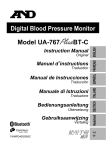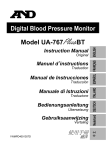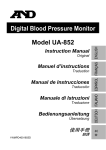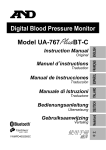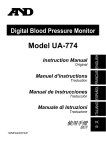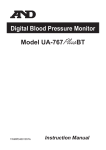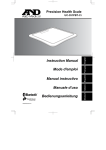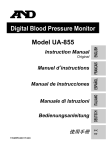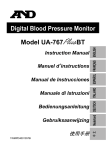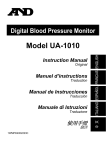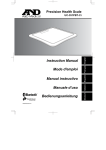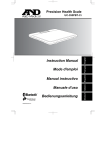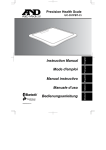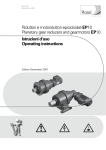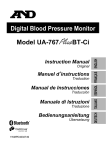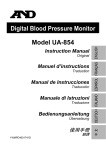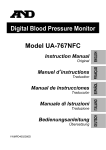Download A&D BT-Ci User's Manual
Transcript
Digital Blood Pressure Monitor Model UA-767 BT-Ci Instruction Manual Original Manuel d’instructions Traduction Manual de Instrucciones Traducción Manuale di Istruzioni Traduzione Bedienungsanleitung Übersetzung 1WMPD4002749 Contents Dear Customers .......................................................................2 Preliminary Remarks.................................................................2 Precautions ..............................................................................2 Parts Identification ...................................................................4 Symbols ...................................................................................5 Using the Monitor.....................................................................6 Installing / Changing the Batteries .......................................6 Connecting the Air Hose ......................................................6 Connecting the AC Adapter..................................................6 Wireless Function.................................................................7 Bluetooth Transmission .......................................................7 Pairing / Unpairing ..............................................................8 Selecting the Correct Cuff Size ...........................................10 Applying the Arm Cuff .......................................................11 How to Take Proper Measurements ......................................11 Measurement.....................................................................11 After Measurement ............................................................11 Measurements........................................................................12 Normal Measurement.........................................................12 Measurement with the Desired Systolic Pressure ................13 Notes for Proper Measurement...........................................13 What is an Irregular Heartbeat ................................................14 Pressure Bar Indicator.............................................................14 About Blood Pressure .............................................................15 What is Blood Pressure? .....................................................15 What is Hypertension and How is it Controlled?..................15 Why Measure Blood Pressure at Home?...............................15 WHO Blood Pressure Classification .....................................15 Blood Pressure Variations...................................................15 Troubleshooting.....................................................................16 Maintenance...........................................................................17 Technical Data........................................................................17 English 1 Dear Customers Congratulations on purchasing a state-of-the-art A&D blood pressure monitor, one of the most advanced monitors available today. Designed for ease of use and accuracy, this monitor will facilitate your daily blood pressure regimen. We recommend that you read through this manual carefully before using the device for the first time. Preliminary Remarks This device conforms to the European Directive 93/42 EEC for Medical mark of conformity. Products. This is made evident by the (0123: The reference number to the involved notified body) The WML-40AH is approved in accordance to R&TTE directive , manufactured by MITSUMI transmitter module marked by incorporated to OEM product. The device complies with part 15 of the FCC rules and contains the FCC ID POOWML-C40. Compliance with Industry Canada. IC: 4250A-WMLC40. The device is a Continua certified, Bluetooth wireless technology enabled medical device. The device is designed for use on adults only, not newborns or infants. Environment for use The device is for use in the home healthcare einvironment. This device is designed to measure blood pressure and pulse rate of people for diagnosis. Precautions Precision components are used in the construction of this device. Extremes in temperature, humidity, direct sunlight, shock or dust should be avoided. Clean the device and cuff with a dry, soft cloth or a cloth dampened with water and a neutral detergent. Never use alcohol, benzene, thinner or other harsh chemicals to clean the device or cuff. Avoid tightly folding the cuff or storing the hose tightly twisted for long periods, as such treatment may shorten the life of the components. The device and cuff are not water resistant. Prevent rain, sweat and water from soiling the device and cuff. English 2 Measurements may be distorted if the device is used close to televisions, microwave ovens, cellular telephones, X-ray or other devices with strong electrical fields. Used equipment, parts and batteries are not treated as ordinary household waste, and must be disposed of according to the applicable local regulations. When the AC adapter is used, make sure that the AC adapter can be readily removed from the electrical outlet when necessary. When reusing the device, confirm that the device is clean. Do not modify the device. It may cause accidents or damage to the device. To measure blood pressure, the arm must be squeezed by the cuff hard enough to temporarily stop blood flow through the artery. This may cause pain, numbness or a temporary red mark to the arm. This condition will appear especially when measurement is repeated successively. Any pain, numbness, or red marks will disappear with time. Contraindications The following are precautions for proper use of the device. Do not apply the cuff to an arm with another medical electrical equipment attached. The equipment may not function properly. People who have a severe circulatory deficit in the arm must consult a doctor before using the device, to avoid medical problems. Do not self-diagnose the measurement results and start treatment by yourself. Always consult your doctor for evaluation of the results and treatment. Do not apply the cuff on an arm with an unhealed wound. Do not apply the cuff on an arm receiving an intravenous drip or blood transfusion. It may cause injury or accidents. Do not use the device where flammable gases such as anesthetic gases are present. It may cause an explosion. Do not use the device in highly concentrated oxygen environments, such as a high-pressure oxygen chamber or an oxygen tent. It may cause a fire or explosion. English 3 Parts Identification DC Jack START Button Display Air Connector Plug Air Socket Air Hose Proper Fit Range Artery Position Mark Index Mark Battery Cover Arm Cuff Battery Compartment 1.5V Batteries (LR6, R6P or AA) Part of Display MEMORY Systolic Pressure Diastolic Pressure Pressure Bar Indicator Pulse Rate Battery Indicator I.H.B. Indicator (Irregular heartbeat indicator) English 4 Heart Mark Symbols Symbols Function / Meaning Standby and power on. Battery installation guide Direct current Type BF: Device, cuff and tubing are designed to provide special protection against electrical shocks. The indicator that appears while measurement is in progress. It blinks when the pulse is detected. Irregular Heartbeat indicator. (I.H.B.) The indicator that appears when an irregular heartbeat or any excessive body movement is detected during the measurement. Previous measurements stored in MEMORY. The battery power indicator during the Full Battery measurement. The indicator blinks when battery power Low Battery is low. Unstable blood pressure due to movement during the measurement. The systolic and diastolic values are within 10 mmHg of each other. The pressure value did not increase during inflation. The cuff is not fastened correctly. PUL. DISPLAY ERROR DIA PUL./min EC REP Measurement is in progress. Remain as still as possible. Replace all batteries with new ones, when the indicator blinks. Try the measurement again. Remain very still during the measurement. Fasten the cuff correctly, and try the measurement again. The pulse is not detected correctly. Pairing or unpairing has not been performed correctly. SYS Recommended Action Pairing in progress Unpairing in progress Pairing or unpairing complete Systolic blood pressure in mmHg Diastolic blood pressure in mmHg. Pulse per minute EC directive medical device label R&TTE directive transmitter module label Manufacturer EU-representative English 5 Remove and re-insert the batteries. Try pairing or unpairing again. Symbols Function / Meaning Recommended Action Date of manufacture Class II device WEEE label Refer to instruction manual/booklet SN Serial number Polarity of DC jack Using the Monitor Step 1 Installing / Changing the Batteries 1. 2. 3. Slide the battery cover up to open it. Remove the used batteries and insert new batteries into the battery compartment as shown, taking care that the polarities (+) and (-) are correct. Slide the battery cover down to close. Use only LR6, R6P or AA batteries. Step 3 Step 2 CAUTION Insert the batteries as shown in the battery compartment. If not, the device will not work. When (LOW BATTERY mark) blinks in the display, replace all batteries with new ones. Do not mix old and new batteries. It may shorten the battery life, or cause the device to malfunction. (LOW BATTERY mark) does not appear when the batteries are drained. Battery life varies with the ambient temperature and may be shorter at low temperatures. Remove the batteries if the device is not to be used for a long time. The batteries may leak and cause a malfunction. Use the specified batteries only. The batteries provided with the device are for testing monitor performance and may have a limited life. Air Hose Connecting the Air Hose Insert the air connector plug into the air socket firmly. Air Connector Plug Air Socket DC jack Connecting the AC Adapter Insert the AC adapter plug into the DC jack. Next, connect the AC adapter to an electrical outlet. Use the specified AC adapter. (Refer to page 18.) AC adapter plug English 6 Using the Monitor Wireless Function CAUTION In the unlikely event that this monitor causes radio wave interference in a different wireless station, change the location where this monitor is used or stop use immediately. Be sure to use in a location where visibility between the two devices that you want to connect is good. The connection distance is reduced by the structure of buildings or other obstructions. In particular, connection may be impossible when devices are used on either side of reinforced concrete. Do not use Bluetooth connection in the range of a wireless LAN or other wireless devices, near devices that emit radio waves such as microwaves, in locations where there are many obstructions, or in other locations where signal strength is weak. Doing so may result in frequent loss of connection, very slow communication speeds and errors. Using close to an IEEE802.11g/b/n wireless LAN device may cause mutual interference to occur, which may result in reduced communication speeds or which may prevent connection. In this case, switch off the power supply to the device that is not being used, or use the monitor in a different location. If the monitor does not connect normally when used near a wireless station or broadcast station, use the monitor in a different location. A&D Company, Limited cannot accept liability for any damages incurred due to impaired operation or data loss, etc. that occur through the use of this product. This product is not guaranteed to connect to all Bluetooth compatible devices. Bluetooth Transmission This product is equipped with a Bluetooth wireless function and can connect to the following Bluetooth devices. Bluetooth devices that can be connected: • Continua certified devices • iPhone, iPad, iPod • Applications and devices that are compatible with SSP and A&D specifications Each device needs an application to receive data. For connection methods, refer to the manual for each device. Bluetooth devices carry the Bluetooth logo mark. Continua certified devices carry the Continua logo mark. iPhone, iPad and iPod are trademarks of Apple Inc., registered in the U.S. and other countries. English 7 Using the Monitor Pairing / Unpairing A Bluetooth device needs to be paired with a different specific device in order to communicate with that device. If this monitor is paired with a receiver device from the start, measurement data is transmitted automatically to the receiver device each time a measurement is made. Unpairing needs to be performed to cancel pairing. Cautions for pairing Be sure to turn the power of all other Bluetooth devices off when pairing. Multiple devices cannot be paired at the same time. If the receiver device cannot receive measurement data, try pairing once again Two receiver devices can be paired to one monitor. Communication is possible with one of the receiver devices. If a third receiver device is paired, the device other than the most recently connected device will be unpaired to enable the new device to be paired. Some applications may allow pairing with only one device. Follow the steps below to pair or unpair the monitor with a Bluetooth compatible receiver device. Also refer to the manual of the receiver device. Please use a pairing wizard if one is provided. Pairing procedure 1. Follow the instructions in the manual of the receiver device to switch it to the pairable status. When pairing this monitor, place it as close as possible to the receiver device to be paired with. 2. Install the batteries or connect the AC adapter as described on page 6. The monitor displays “pr”. The monitor will be in a state that can be found by the receiver device for about two minutes. 3. The monitor displays “end” to indicate that pairing is complete. 4. If “err10” is displayed or pairing is failed, remove the batteries or disconnect the AC adapter and try steps 1-3 again. 5. Follow the manual of the pairing receiver device to search for, select and pair with this monitor. If a PIN code is requested by the receiver device, enter "39121440". English 8 Using the Monitor Unpairing procedure 1. Press and hold the START button until “upr” is displayed. 2. Press the START button again. Unpairing will be performed. 3. The monitor displays “end” ” to indicate that unpairing is complete. When two receiver devices are paired, both devices are unpaired. 4. If “err10” or “err11” is displayed or unpairing is failed, try steps 1-3 again. Communication distance The communication distance between this monitor and the receiver device is dependent on the Bluetooth output class of the receiver device. When the receiver device is a Class 1 Bluetooth device: Less than 100 m When the receiver device is a Class 2 Bluetooth device: Less than 10 m This distance is reduced by the conditions in the surrounding environment, so be sure to check that the distance is short enough for a connection to be made after measurement is complete. Memory In cases when the receiver device cannot receive measurement data, the measurement data is temporarily stored in the monitor memory. The data stored in the memory is transmitted the next time a connection is successfully made to the receiver device A total of 200 sets of measurement data can be stored. When the amount of data exceeds 200 sets, the oldest data is deleted and the new data is stored. The amount of data that can be stored temporarily may vary with the application. Time This monitor has a built-in clock. The date and time that a measurement was taken is included in the measurement data. The built-in clock is designed to be automatically adjusted by syncing with the clock of a receiver device. Refer to the specifications of the receiver device. This monitor has no clock adjustment function. English 9 Using the Monitor Selecting the Correct Cuff Size Using the correct cuff size is important for an accurate reading. If the cuff is not the proper size, the reading may yield an incorrect blood pressure value. The arm size is printed on each cuff. The index and proper fit range, on the cuff, tell you if you are applying the correct cuff. (Refer to "Symbols that are printed on the cuff".) If the index points outside of the range, contact your local dealer to purchase a replacement cuff. The arm cuff is a consumable. If it becomes worn, purchase a new one. Arm Size Recommended Cuff Size 32 cm to 45 cm Large adult cuff 22 cm to 32 cm Adult cuff Arm size: The circumference of the biceps. Note: Model UA-767 BT-Ci is not designed for using a small adult cuff. Symbols that are printed on the cuff Symbols Function/Meaning Recommended Action Set the mark on the artery of the upper arm or in line with the ring finger on the inside of the arm. Artery position mark ▲ REF Catalog Number CUF-D-LA CUF-D-A Index Catalog number Proper fit range for the adult cuff. It's printed on the adult cuff. Range to use the large adult cuff. Over range printed on the adult cuff. Proper fit range for the large adult cuff. It's printed on the large adult cuff. Under range printed on the adult cuff. Range to use the adult cuff. It's printed on the large adult cuff. Use the large adult cuff instead of the adult cuff. Use the adult cuff instead of the large adult cuff. Lot number Proper fit range Large adult cuff Proper fit range Adult cuff English 10 Using the Monitor Applying the Arm Cuff 1. Wrap the cuff around the upper arm, about 1-2 cm above the inside of the elbow, as shown. Place the cuff directly against the skin, as clothing may cause a faint pulse, and result in a measurement error. Do not roll up shirtsleeve tightly Cuff Artery position mark 2. Constriction of the upper arm, caused by tightly rolling up a shirtsleeve, may prevent accurate readings. 3. Confirm that the index within the proper fit range. 1 to 2 cm Secure the fabric fastener firmly Air hose points Index and Proper fit range How to Take Proper Measurements For the most accurate blood pressure measurement: Sit comfortably on a chair. Rest your arm on the table. Do not cross your legs. Keep your feet on the floor and straighten your back. Relax for about five to ten minutes before measurement. Place the center of the cuff at the same height as your heart. Remain still and keep quiet during measurement. Do not measure immediately after physical exercise or a bath. Rest for twenty or thirty minutes before taking the measurement. Try to measure your blood pressure at the same time every day. Measurement During measurement, it is normal for the cuff to feel very tight. (Do not be alarmed) After Measurement After measurement, press the START Remove the cuff and record your data. button to turn off the power. Note: The device has an automatic power shut-off function, which turns the power off approximately one minute after measurement. Allow at least three minutes between measurements on the same person. English 11 Measurements Model UA-767 BT-Ci is designed to detect the pulse and to inflate the cuff to a systolic pressure level automatically. If your systolic pressure is expected to exceed 230 mmHg or you use the optional small cuff, read "Measurement with the desired systolic pressure" on the next page. Normal Measurement 1. Place the cuff on the arm (preferably the left arm). At heart level Sit quietly during measurement. 2. Press the START button. The last data of systolic and diastolic pressure and pulse rate are displayed briefly. Then the display changes, as indicated in the figure at the right, as the measurement begins. The cuff starts to inflate. It is normal for the cuff to feel very tight. A pressure bar indicator is displayed, as in the figure at the right, during inflation. Note: If you wish to stop inflation at any time, press the START button again. 3. When inflation is complete, deflation starts automatically and the (heart mark) blinks, indicating that the measurement is in progress. Once the pulse is detected, the mark blinks with each pulse beat. Note: If an appropriate pressure is not obtained, the device starts to inflate again automatically. 4. 5. When the measurement is complete, the systolic and diastolic pressure readings and pulse rate are displayed. The cuff exhausts the remaining air and deflates completely. Press the START off the power. button again to turn START button The last data at initial display Starts inflation Pressurizing Measurement in progress Systolic pressure Diastolic pressure Pulse rate Exhausts remaining air automatically Note: Model UA-767 BT-Ci is provided with an automatic power shut-off function. Allow at least three minutes between measurements on the same person. English 12 Measurements Measurement with the Desired Systolic Pressure If your systolic pressure is expected to exceed 230 mmHg or you use the optional small cuff, use this procedure. 1. Place the cuff on the arm (preferably the left arm). 2. Press and hold the START button until a number about 30 to 40 mmHg higher than your expected systolic pressure appears. 3. Release the START button to start measurement, when the desired number is reached. Then continue to measure your blood pressure as described on the previous page. At heart level Press and hold the button Release the button at the desired systolic pressure Refer to the previous page for measurement Notes for Proper Measurement Sit down in a comfortable position. Place the arm to be used for the measurement on a table or other support so that the center of the cuff will be at the same height as your heart. Relax for about five or ten minutes before taking a measurement. If you are excited or depressed by emotional stress, the measurement will reflect this stress as a higher (or lower) than normal blood pressure reading and the pulse reading will usually be faster than normal. An individual's blood pressure varies constantly, depending on what you are doing and what you have eaten. What you drink can have a very strong and rapid effect on your blood pressure. This device bases its measurements on the heartbeat. If you have a very weak or irregular heartbeat, the device may have difficulty determining your blood pressure. Should the device detect a condition that is abnormal, it will stop the measurement and display an error symbol. See page 5 for the description of symbols. This blood pressure monitor is intended for use by adults only. Consult with your physician before using this device on a child. A child should not use this device unattended. English 13 What is an Irregular Heartbeat Model UA-767 BT-Ci blood pressure monitor provides a blood pressure and pulse rate measurement even when an irregular heartbeat occurs. An irregular heartbeat is defined as a heartbeat that varies by 25% from the average of all heartbeats during the blood pressure measurement. It is important that you be relaxed, remain still and do not talk during measurements. Note: We recommend contacting your physician if you see this indicator frequently. Pressure Bar Indicator The indicator monitors the progress of pressure during measurement. Pressurizing Inflation in progress Releasing air Measurement in progress Inflation complete English 14 About Blood Pressure What is Blood Pressure? Blood pressure is the force exerted by blood against the walls of the arteries. Systolic pressure occurs when the heart contracts. Diastolic pressure occurs when the heart expands. Blood pressure is measured in millimeters of mercury (mmHg). One's natural blood pressure is represented by the fundamental pressure, which is measured first thing in the morning while one is still at rest and before eating. What is Hypertension and How is it Controlled? Hypertension, an abnormally high arterial blood pressure, if left unattended, can cause many health problems including stroke and heart attack. Hypertension can be controlled by altering lifestyle, avoiding stress, and with medication under a doctor’s supervision. To prevent hypertension or keep it under control: Do not smoke Exercise regularly Reduce salt and fat intake Have regular physical checkups Maintain proper weight Why Measure Blood Pressure at Home? Blood pressure measured at a clinic or doctor's office may cause apprehension and can produce an elevated reading, 25 to 30 mmHg higher than that measured at home. Home measurement reduces the effects of outside influences on blood pressure readings, supplements the doctor's readings and provides a more accurate, complete blood pressure history. WHO Blood Pressure Classification Blood Pressure Variations Diastolic blood pressure Standards to assess high Reference Material: Journal of Hypertension 1999, Vol 17 No.2 blood pressure, without mmHg Grade 3 hypertension (severe) 110 regard to age, have been Grade 2 hypertension (moderate) 105 established by the World 100 Health Organization (WHO), Grade 1 hypertension (mild) 95 as shown in the chart. 90 85 80 High-normal Normal Optimal An individual’s blood pressure 120 130 140 150 160 170 180 varies greatly on a daily and Systolic blood pressure mmHg seasonal basis. It may vary by 30 to 50 mmHg due to various conditions during the day. In hypertensive individuals’ variations are even more pronounced. Normally, the blood pressure rises while at work or play and falls to its lowest levels during sleep. So, do not be overly concerned by the results of one measurement. Take measurements at the same time every day using the procedure English 15 Typical fluctuation within a day (Measured every five minutes) Systolic Blood pressure described in this manual to get to know your normal blood pressure. Regular readings give a more comprehensive blood pressure history. Be sure to note date and time when recording your blood pressure. Consult your doctor to interpret your blood pressure data. Sleep Diastolic PM AM Time Troubleshooting Problem Possible Reason Nothing appears Batteries are drained. in the display, even when the Battery terminals are not power is turned in the correct position. on. Battery power is low. (LOW BATTERY The cuff does mark) blinks. [ If the not inflate. batteries are drained completely, the mark does not appear.] The cuff is not applied properly. You moved your arm or body during the The unit does measurement. not measure. Readings are The cuff position is not too high or too correct. low. Recommended Action Replace all batteries with new ones. Reinstall the batteries with negative and positive terminals matching those indicated on the battery compartment. Replace all batteries with new ones. Apply the cuff correctly. Make sure you remain very still and quiet during the measurement. Sit comfortably and still. Raise your hand so that the cuff is at the same level as your heart. If you have a very weak or irregular heat beat, the device may have difficulty in determining your blood pressure. The value is different See “Why measure blood from that measured at a pressure at home”. clinic or doctor’s office. Other Remove the batteries. Place them back properly and try the measurement again. Note: If the actions described above do not solve the problem, contact the dealer. Do not attempt to open or repair this product, as any attempt to do so will make your warranty invalid. English 16 Maintenance Do not open the device. It uses delicate electrical components and an intricate air unit that could be damaged. If you cannot fix the problem using the troubleshooting instructions, request service from your dealer or from the A&D service group. The A&D service group will provide technical information, spare parts and units to authorized dealers. The device was designed and manufactured for a long service life. However it is generally recommended to have the device inspected every 2 years, to ensure proper functioning and accuracy. This maintenance recommendation is for European customers only, to comply with regulatory requirements. Routine inspection and maintenance is not needed for non-European customers. Please contact either your authorized dealer or A&D for maintenance. Technical Data Type Measurement method Measurement range UA-767PBT-Ci Oscillometric measurement Pressure: 20 - 280 mmHg Pulse: 40 - 200 beats / minute Measurement accuracy Pressure: ±3 mmHg Pulse: ±5% Power supply 4 x 1.5V batteries (LR6, R6P or AA) or AC adapter (TB-233) (Not included) Number of measurements Approx. 450 measurements, when AA Alkaline batteries are used, with pressure value of 180 mmHg at room temperature of 23°C Classification Internally powered ME equipment (Supplied by batteries) / Class II (Supplied by adapter) Clinical test According to ANSI / AAMI SP-10 1987 EMC IEC 60601-1-2: 2007 Wireless communication WML-40AH (MITSUMI Electronics Co. Ltd.) Bluetooth Ver.2.1 Class 1 HDP SSP Continua certified Operating conditions +10°C to +40°C / 15%RH to 85 %RH/ 800 hPa to1060 hPa Transport / Storage conditions -10°C to +60°C / 15%RH to 85 %RH Dimensions Approx. 147 [W] x 64 [H] x 110 [D] mm Weight Approx. 300 g, excepting batteries Applied part Cuff Type BF English 17 Useful life Accessory AC adapter TB-233 TB-233C Device: 5 years (when used six times a day) Cuff: 2 years (when used six times a day) The adapter is to connect the blood pressure monitor to a power source at home. Please contact your local A&D dealer for purchasing. The AC adapter is required to be inspected or replaced periodically. Input: 100-240V Output: 6V 500mA 139°C TB-233BF 2A Input: 100-240V 500mA Output: 6V 139°C 2A Accessories sold separately Cuff Arm Size Catalog Number Cuff Size CUF-D-LA Large adult cuff 32 cm to 45 cm CUF-D-A Adult cuff 22 cm to 32 cm AC adapter Catalog Number Plug TB-233C Type C TB-233BF Type BF Note: Specifications are subject to change for improvement without prior notice. EMC table information is listed on our website: http://www.aandd.jp/products/manual/medical/emc_acadapter_en.pdf English 18




















